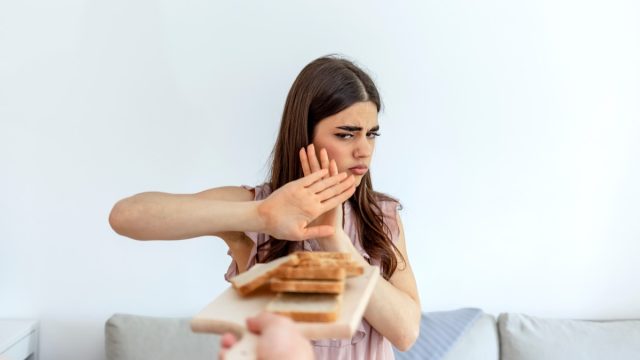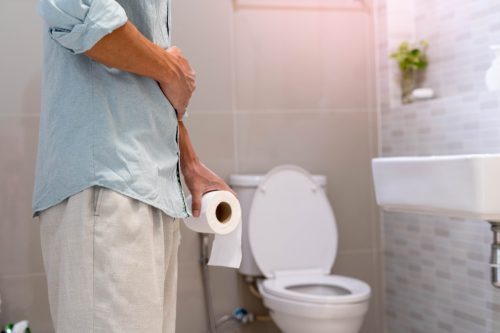What Happens to Your Body When You Stop Eating Gluten, According to Experts

It seems like more and more people are going gluten-free these days, whether it’s because they have celiac disease, are gluten-intolerant, or are simply trying to pinpoint and resolve digestive problems and other bothersome issues. Gluten, which is a protein that’s chiefly found in wheat, barley, and rye, can cause symptoms ranging from brain frog and bloating to headaches and diarrhea in individuals who are sensitive to it, the Mayo Clinic explains.
“A gluten-free diet excludes any foods that contain gluten… it means eating only whole foods that don’t contain gluten, such as fruits, vegetables, meat and eggs, as well as processed gluten-free foods like gluten-free bread or pasta,” Selvi Rajagopal, MD, a specialist in internal medicine and obesity, told John Hopkins Medicine. “Some people think going gluten-free means not eating any carbohydrates, but this isn’t the case. Lots of foods that contain carbs, such as rice, potatoes and beans, don’t contain gluten.”
Going gluten-free is certainly a shift in lifestyle—so long, pizza and sandwiches—but besides adjusting your grocery-shopping habits and standing takeout order, what can you expect when you make this change? Read on to find out what may happen to your body when you stop eating gluten.
READ THIS NEXT: This Is What Happens When You Take Ibuprofen 30 Days in a Row, According to Doctors.
You may feel worse before you feel better.

Just like lifting weights for a few days won’t give you sculpted arms, cutting out gluten won’t solve your digestive woes right away. “Once you start a gluten-free diet, your symptoms are not likely to disappear overnight,” says Christina Towle, a certified clinical nutritionist with Charlie’s Table Oasis. “In fact, you may feel worse before you start to feel better.” She tells Best Life that the amount of time it takes to see a difference will depend on what your symptoms are, how long you’ve had them, and how severe they are.
And while Rajagopal told John Hopkins that “there’s no scientific evidence” that discontinuing gluten causes withdrawal, she said there is anecdotal evidence of trouble adjusting to a gluten-free diet. “Some people report feeling dizziness, nausea, extreme hunger, and even anxiety and depression when they suddenly go from eating a lot of gluten to being gluten-free,” she said. “These symptoms usually go away after a few weeks on a gluten-free diet, but talk to your health care provider if they persist.”
You may become deficient in other nutrients.

When you stop eating gluten, it’s important to make sure you’re getting enough whole grains, fiber, and other nutrients in your diet from other sources, say the experts at Johns Hopkins Medicine. “Getting enough whole grains in your diet is especially important if you’re at risk for heart disease or diabetes,” they write, noting that whole grains help reduce cholesterol levels and regulate blood sugar, and that certain foods that have gluten in them also contain “important vitamins and minerals, such as B vitamins, iron, and magnesium.”
Rajagopal said that for people who don’t have celiac disease, removing highly processed foods from their diets, rather than those containing gluten, may be enough to resolve their symptoms—and points out that “a gluten-free label doesn’t necessarily make a food healthy… Some processed gluten-free foods contain high amounts of unhealthy ingredients such as sodium, sugar and fat. Consuming these foods can lead to weight gain, blood sugar swings, high blood pressure, and other problems.”
Your digestion may improve.

On the plus side, if you are sensitive to gluten, then cutting it out could help you feel much better over time. And although it won’t happen overnight, your digestive issues (constipation, bloating, diarrhea, etc.) may not take as much time as you think to resolve. “Many people report digestive symptom improvement within a few days of dropping gluten,” Verywell Health reports.
Be careful, though: The site writes that once you stop eating gluten, you could have an even worse reaction to gluten if you accidentally ingest it, or decide to cheat a little bit and treat yourself to a bit of pizza or pasta. “Unfortunately, it’s normal for your reactions to gluten—even a tiny bit of it—to get worse once you’ve gone gluten-free,” they say, warning that you’ll want to be wary of possible gluten cross-contamination after adopting your new lifestyle.
For more health news sent directly to your inbox, sign up for our daily newsletter.
You may start sleeping better.

Digestive issues aren’t the only thing that might resolve when you drop gluten from your diet. Carlie Gasia, a certified sleep science coach at Sleepopolis, says that certain individuals might notice that they’re getting better rest after changing their eating habits.
“Some people with celiac disease or gluten sensitivity have reported improved sleep quality after eliminating gluten from their diet. This may be due to the reduction in digestive issues and inflammation that can disrupt sleep,” she tells Best Life. “Inflammation is a natural immune response to injury or infection, but chronic inflammation can lead to a range of health issues, including sleep problems.”
Gasia notes, however, that stress levels, sleep environment, and overall health also impact sleep quality, and that cutting gluten out of your diet is not a cure-all for troubled sleep. “It’s also possible for individuals to have celiac disease or gluten sensitivity and not experience any sleep issues.”
Best Life offers the most up-to-date information from top experts, new research, and health agencies, but our content is not meant to be a substitute for professional guidance. If you have health questions or concerns, always consult your healthcare provider directly.